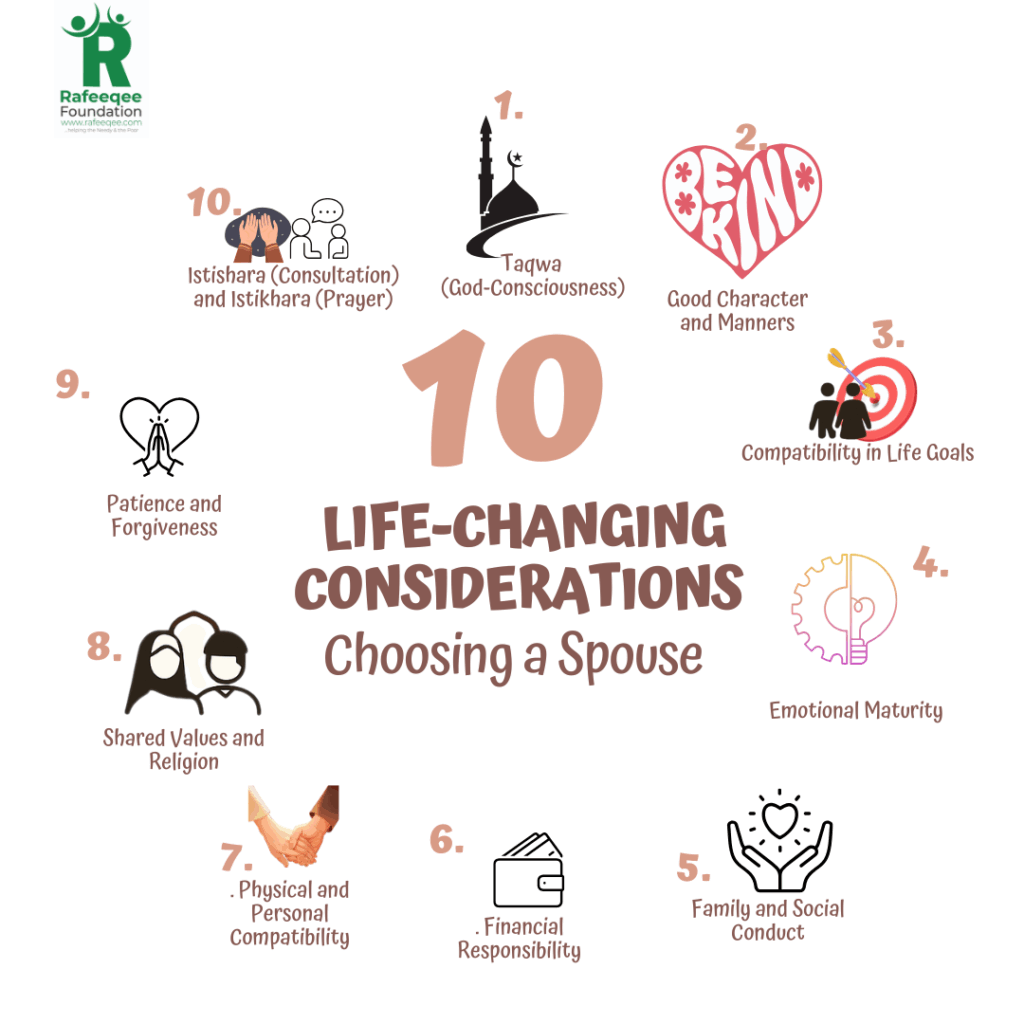Choosing a spouse is a pivotal decision in a Muslim life, shaping one’s faith, character, and life trajectory; not just a matter of companionship or attraction. Islam gives us guidance on what to prioritize in this critical choice. It is a decision that is more than swiping right, sharing interests, or enjoying a fleeting attraction. It’s about laying the foundation for a lifetime of love, companionship, and faith.
For Muslims, marriage is not just a personal milestone; but a bond built on love, companionship, and shared spiritual growth.
But how do you know if someone is truly right for you? How can you balance your heart, your mind, and your faith in making this life-altering decision?
In this article, we explore 10 essential considerations every adult Muslim should reflect on before choosing a spouse, drawing from the Qur’an, Sunnah, and the wisdom of the righteous predecessors. These points are designed not just to guide, but to provoke reflection, conversation, and clarity as you take one of the most important steps of your life.
Essential Considerations
1. Taqwa (God-Consciousness)
Piety is the most important factor while choosing a spouse, as a partner with strong faith will encourage you to grow closer to Allah, fulfill, and uphold your Islamic obligations.
Ask yourself: Would this person remind me of Allah, inspire me to pray, not make me falter in faith, and encourage me to be better?
The Prophet ﷺ said:
“A woman may be married for four things: her wealth, her lineage, her beauty, and her religious commitment. Marry the one who is religious, may your hands be rubbed with dust [i.e., may you prosper].”
— Sahih al-Bukhari and Muslim
2. Good Character and Manners
Character is revealed not only in moments of comfort but in trials. Consider how your potential spouse treats his or her family members, staff, and even strangers. Reflect on whether their manners resonate with the Prophet’s guidance on kindness, patience, and humility.
The Prophet ﷺ said:
“The best among you are those with the best manners.”
— Sahih al-Bukhari
3. Compatibility in Life Goals
Marriage is a partnership between a man and a woman. Hence, it is essential to discuss your ambitions, career aspirations, and family visions early enough before you decide to move further. Ask each other “where you want your lives to go.” For example, Ali ibn Abi Talib (RA) and Fatimah (RA) had a marriage grounded in faith, character, and shared goals.
4. Emotional Maturity
A spouse must be able to navigate life’s highs and lows with wisdom and patience. Assess how your partner handles conflict, responsibility, self-awareness, and empathy. Do they handle disagreements calmly or harshly? Do they accept responsibility for mistakes or always blame others?
5. Family and Social Conduct
Lineage and background is one of the reasons for which people get married. Many people like to marry into a wealthy or reputable family. While your spouse is an individual, their family often shapes their values. Islam encourages kindness and respect toward family.
6. Financial Responsibility
While wealth is not the main criterion, responsibility with money is critical. Prophet ﷺ once advised a woman not to marry a man who was miserly. Financial honesty, planning, and the ability to provide for a household is essential for a man, while a woman shouldn’t be extravagant or wasteful with her husband’s wealth. Therefore, it’s important to discuss expectations openly without assuming, and shying away from important money matters.
7. Physical and Personal Compatibility
While beauty and attraction is not superficial; Islam acknowledges it as part of the reasons for which a woman is desired. A man once came to the Prophet ﷺ telling him he wanted to get married to a woman. The Prophet ﷺ asked him “have you seen her?” He was emphasizing that to be sure that he knows what he’s settling for.
Compatibility here includes mutual respect for personal hygiene, habits, health, and lifestyle.
8. Shared Values and Religion
Faith is foundational and some Muslims compromise this which often leads to dissatisfaction in the long run. Discuss spiritual priorities and practices. This is crucial in strengthening a marriage and prevents conflicts. Many marriages fail today because they lack the shared value of being husband and wife in Jannah.
9. Patience and Forgiveness
While no one is perfect, you must ensure that you find someone who can tolerate your imperfections without judgement. The ability to forgive, adapt, and remain patient during difficulties is key. The Prophet ﷺ exemplified patience throughout his life, even with challenges in his family.
10. Istishara (Consultation) and Istikhara (Prayer)
Finally, ask people who know your proposed spouse about their character and lifestyle, then seek Allah’s guidance. Making Istikhara is a non-negotiable part in all of this. Ask about your spouse in their Muslim community, consult trusted mentors, and discuss openly with their family.
As the Prophet ﷺ advised:
“If any one of you is considering marriage, he should seek advice and perform Istikhara for it.”
The beauty of this is that you’re asking Allah sincerely for guidance and not just relying upon what you know and what people say.
Conclusion
Choosing a spouse is more than following your heart. It is a journey of faith, reflection, and foresight. The right partner will not only walk beside you through life’s joys and challenges but also inspire you to grow closer to Allah and embody your best self.
By prioritizing faith, character, compatibility, and patience, while seeking Allah’s guidance through prayer and consultation, you lay the foundation for a marriage that is blessed, enduring, and spiritually uplifting.
Remember, marriage is not just a union of two people. It is a partnership in faith, a shared journey toward Jannah, and an opportunity to build a home rooted in love, respect, and devotion.
Choose wisely, reflect deeply, and let your heart and faith guide you to a companion who will make this life and the next truly meaningful.
May Allah aid you and grant you the best of endeavors. Amin!

